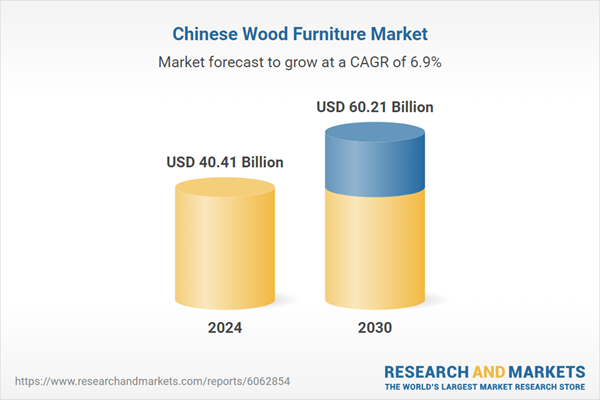Speak directly to the analyst to clarify any post sales queries you may have.
10% Free customizationThis report comes with 10% free customization, enabling you to add data that meets your specific business needs.
Demand for high-quality, eco-friendly, and customized furniture is playing a pivotal role in shaping the industry landscape. Technological innovations - such as automation and the integration of smart functionalities - are further enhancing production efficiency. Additionally, China's wood furniture export sector remains robust. In the first seven months of 2024 alone, exports surged by 24%, with total export volume reaching 256 million pieces.
Key Market Drivers
Urbanization and Rising Disposable Incomes
Rapid urban development in China continues to be a primary driver of the wood furniture market. The ongoing migration to urban centers has resulted in growing demand for both residential and commercial furnishings. Government initiatives focused on infrastructure development, smart city projects, and large-scale housing construction are accelerating the need for home and office furniture.Moreover, China's expanding middle class with higher disposable income levels is fueling consumption in the home décor and furnishings segment. Consumers are increasingly drawn to premium, stylish, and functional wooden furniture. The market is witnessing a clear shift away from mass-produced, budget options toward branded, customized, and higher-end products, reflecting evolving lifestyle preferences.
Key Market Challenges
Rising Raw Material Costs and Supply Chain Disruptions
The escalating cost of raw materials - particularly wood - poses a significant challenge for industry players. Global supply chain disruptions, environmental regulations, and trade barriers have driven up timber prices, placing pressure on manufacturing costs.China depends on both domestic and imported wood sources. However, stringent environmental policies around logging and timber harvesting have curtailed domestic supply, forcing manufacturers to import more expensive timber from markets such as Canada, Russia, and the United States. Price volatility, influenced by geopolitical tensions and tariffs, adds further complexity.
Key Market Trends
Rising Demand for Customization and Smart Furniture
Customization is gaining prominence in China’s wood furniture market, driven by consumer desire for personalized living spaces. Buyers are increasingly looking for furniture that matches their specific style preferences, space configurations, and functional needs. In response, manufacturers are expanding made-to-order and modular product offerings.Many companies now provide customization tools that allow customers to select materials, finishes, dimensions, and color schemes. The use of augmented reality (AR) and online design platforms enables buyers to visualize products prior to purchase, further enhancing the buying experience. This trend is encouraging digital transformation across the industry, with firms investing in AI-powered design technologies and automated production systems.
Concurrently, demand for smart furniture is on the rise. Tech-enabled wooden furniture - featuring wireless charging stations, smart storage solutions, and voice-activated controls - is gaining traction. Integration of Internet of Things (IoT) technology is fostering innovation, catering to a growing segment of tech-savvy consumers who prioritize convenience and multifunctionality in home furnishings.
Key Market Players
- Interi Furniture
- Qumei Furniture
- Zhejiang Huafeng Furniture
- Guangdong Landbond Furniture Group Co., Ltd.
- Chengdu Sunhoo Industry Co
- IKEA (China) Investment Co., Ltd.SS
- Honland Group Furniture
- Guangzhou Holike Creative Home Co., Ltd.
- Huafeng Furniture Group Co., Ltd
- Zhejiang Huaweimei Group Co., Ltd.
Report Scope:
In this report, the China Wood Furniture Market has been segmented into the following categories, in addition to the industry trends which have also been detailed below:China Wood Furniture Market, By Application:
- Home Furniture
- Office Furniture
- Hospitality Furniture
- Others
China Wood Furniture Market, By Sales Channel:
- Supermarket/Hypermarket
- Specialty Stores
- Online
- Others
China Wood Furniture Market, By Region:
- East
- South-West
- South-Central
- North-East
- North-West
- North
Competitive Landscape
Company Profiles: Detailed analysis of the major companies present in the China Wood Furniture Market.Available Customizations:
With the given market data, the publisher offers customizations according to a company's specific needs. The following customization options are available for the report.Company Information
- Detailed analysis and profiling of additional market players (up to five).
This product will be delivered within 1-3 business days.
Table of Contents
Companies Mentioned
- Interi Furniture
- Qumei Furniture
- Zhejiang Huafeng Furniture
- Guangdong Landbond Furniture Group Co., Ltd.
- Chengdu Sunhoo Industry Co
- IKEA (China) Investment Co., Ltd.SS
- Honland Group Furniture
- Guangzhou Holike Creative Home Co., Ltd.
- Huafeng Furniture Group Co., Ltd
- Zhejiang Huaweimei Group Co., Ltd.
Table Information
| Report Attribute | Details |
|---|---|
| No. of Pages | 81 |
| Published | April 2025 |
| Forecast Period | 2024 - 2030 |
| Estimated Market Value ( USD | $ 40.41 Billion |
| Forecasted Market Value ( USD | $ 60.21 Billion |
| Compound Annual Growth Rate | 6.9% |
| Regions Covered | China |
| No. of Companies Mentioned | 10 |









